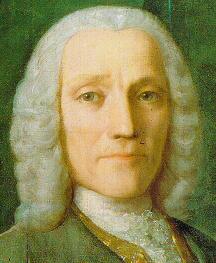![Piano's Solo Corner [Image]](piano8b.gif)
![Piano's Solo Corner [Image]](piano8b.gif)

| Date/Place of Birth: | 26 October, 1685 in Naples, Italy |
| Personality: | Hailed as one of the most distinguished Italian keyboard composers of Baroque period. Being
brought up in a musical family, it was not uncommon that Scarlatti engaged in musical activities in his early childhood. He received his
earliest musical education from his father, Alessandro who was a well-known composer during his time. Later, he was taught by Francesco
Gasparini, an Italian composer and Bernardo Pasquini, an outstanding keyboard player.
Scarlatti's musical talents must have been impressive enough that he was already appointed as an organist and composer of the Naples royal chapel when he was only 15 years old. After that, he held several musical posts in Venice and Rome. Scarlatti was not as daring and rebellious as the young Beethoven. Instead, he was under the shadow of his domineering father and obeyed every decision and order from him. Therefore, he did not have freedom in doing whatever he wished. Finally, he was no longer succumbed to the excessive pressure of his father after he gained legal independence at the age of 32. There were rumours that Scarlatti was a happy-go-lucky man and an avid gambler. Nevertheless, he was well-known among his musical circle for being well-mannered and amiable to others. He became acquainted with several composers such as Handel and Corelli and some admirers like Thomas Roseingrave who introduced his music to England. His biographer, John Mainwaring wrote about him,"Besides his great talents as an artist, he has the sweetest temper and the genteelest behaviour." |
| Piano-Playing Style: | Scarlatti was one of the most outstanding keyboard virtuoso who displayed a new kind of playing style: flamboyant, nimble and lucid.
There was an interesting account where Handel and Scarlatti had a contest in playing the organ and harpsichord. It turned out that the former was excellent for his organ playing while the latter for his prowess in playing harpsichord. |
| Music: | Due to the excruciating influence of his dictatorial father, it was not surprising that his talents were not fully blossomed and hence,
his early works (i.e. operas, oratorios and sacred music) were mediocre and merely a reflection of the common characteristics of his father's music to some extent.
After having gained legal independence in 1717, Scarlatti had much freedom in his composing approach without the strict supervision of his father. Subsequently, he produced some of the most gripping and strikingly individual keyboard sonatas ever composed. Scarlatti's keyboard sonatas were basically a one-movement piece in binary form whereby a dance was taken as a model and then further expanded in his own style. These sonatas were blended with a great diversity of moods - exciting, joyful, vigorous, plaintive, serene, serious etc. Today, his stylish sonatas are one of the most important keyboard repertoire of Baroque period. |
| Composing Habit: | Physically, Scarlatti was a slender man with long arms and strong supple hands. Such physical attributes account for crossing of hands, wide leaps,
fast octaves, fleeting double notes and repeated notes, sparkling ornaments, sweeping arpeggios etc that characterise his trademark composing style.
Scarlatti rarely applied polyphonic texture, but provided frequent repetition of melodies with virtually constant rhythmic patterns. Occasionally, imitation of the melody on the bass part could be found in some of his sonatas. Harmonically, he used to add bold dissonance by using the accompanying chords on the left-hand part, and occasional unexpected modulations. In modulation, he usually prolonged a particular modulated passage to emphasize that the modulation to another key was evidently heard, therefore, most of his sonatas were tonally stable. In addition, one of the most interesting features found in his sonatas was 'exotic' ornamentation. His obsessive use of acciaccaturas, trills and mordents not only reflected the Spanish and Portuguese music of 18th Century that inspired him in his sonatas, but also enhanced the excitement and glory of his music. In conclusion, Scarlatti's reputation as an unique Italian composer of 18th Century was certainly well-established. |
| Scarlatti's Death: | The great keyboard composer died on 23 July, 1757 in Madrid at the age of 72. |